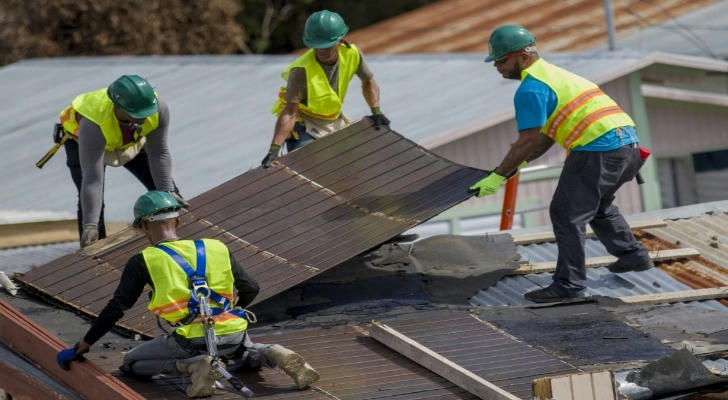Exploring Employment in Roof Maintenance: Insights into the Industry, Market Prospects, and Skill Development
Introduction
Roof maintenance is an essential yet often overlooked profession that plays a vital role in ensuring the longevity and safety of residential, commercial, and industrial properties. This article delves into the core aspects of roof maintenance work, its market potential, government policies supporting this industry, and how aspiring workers can acquire the necessary skills to thrive in this field.

Understanding the Nature of Roof Maintenance Work.
Roof maintenance involves inspecting, repairing, and maintaining roofing structures to protect buildings from weather-related damage and general wear and tear. Key responsibilities include:
Inspection: Identifying potential issues such as leaks, cracks, or structural weaknesses.
Repair and Replacement: Fixing damaged shingles, gutters, and other components, or replacing sections of the roof entirely.
Preventative Maintenance: Applying sealants, cleaning gutters, and reinforcing weak areas to extend the roof's lifespan.
Safety Compliance: Ensuring all tasks meet local building codes and safety standards.
Roof maintenance workers often operate at heights and in various weather conditions, making safety protocols and proper equipment crucial to their daily routines.
Current Market Prospects for Roof Maintenance
The roof maintenance industry in the United States is experiencing steady growth due to increasing awareness of preventative maintenance and a surge in construction and renovation projects. Key drivers include:
Aging Infrastructure: Many buildings in the U.S. require regular maintenance to meet safety standards.
Extreme Weather Conditions: Frequent hurricanes, storms, and snowfall necessitate prompt roof repairs and reinforcements.
Energy Efficiency Trends: Homeowners and businesses are investing in energy-efficient roofing solutions, creating demand for skilled maintenance workers.
Increased Renovation Projects: As property values rise, owners are more willing to invest in maintaining their assets.
According to recent market analyses, the roofing industry is projected to grow at a compound annual growth rate (CAGR) of 4.3% through 2030, highlighting ample job opportunities for skilled workers.

Government Support and Policies
The U.S. government has implemented various initiatives to support the construction and roof maintenance sectors, such as:
Tax Credits for Energy-Efficient Roofing: Homeowners and businesses can claim tax benefits for installing eco-friendly and energy-efficient roofing systems, indirectly boosting demand for roof maintenance services.
OSHA Safety Regulations: The Occupational Safety and Health Administration (OSHA) enforces strict safety standards, ensuring a safer working environment for roof maintenance professionals.
Workforce Development Grants: Federal and state governments provide funding for vocational training programs to address the growing need for skilled labor in construction and roofing.
Disaster Relief Funding: Post-disaster recovery programs often include grants for repairing and maintaining damaged roofs, creating temporary job opportunities.
How to Acquire Roof Maintenance Skills
Becoming a skilled roof maintenance worker requires a combination of on-the-job experience, formal training, and safety certifications. Here's how aspiring professionals can get started:
Vocational Training Programs: Many community colleges and trade schools offer courses in roofing and construction, covering essential skills like material handling, structural design, and repair techniques.
Apprenticeships: Joining an apprenticeship program allows trainees to learn directly from experienced professionals while earning a salary.
Certifications: Obtaining certifications such as the OSHA Safety Certificate, National Roofing Contractors Association (NRCA) certifications, or specialty training in green roofing can enhance employability.
Hands-On Experience: Working with a reputable roofing company provides practical experience and exposure to diverse projects.

** Benefits of a Career in Roof Maintenance**
Roof maintenance offers several advantages for those considering a career in this field:
Job Stability: With consistent demand for maintenance services, the job offers long-term security.
Good Earnings Potential: Skilled workers can earn competitive salaries, with additional income opportunities through overtime and specialized projects.
Career Growth: Experienced workers can advance to supervisory roles, start their own businesses, or specialize in niche areas like solar panel installation.
Physical Activity: The work keeps employees physically active, which can be beneficial for overall health.
A Real-Life Story: John’s Path to Success
John, a 32-year-old from Ohio, began his career as a roof maintenance apprentice after completing a six-month vocational training program. Initially unsure about his future, he soon discovered the rewarding nature of the job. “I was drawn to the hands-on aspect of the work,” John recalls. “Every project is different, and it feels great to know that my efforts protect people’s homes and businesses.”
Within five years, John advanced to a supervisor role, overseeing a team of ten workers. Thanks to certifications in energy-efficient roofing, he also started consulting on green roofing projects, doubling his income. “This career has given me financial stability and the satisfaction of knowing I’m making a tangible difference,” John shares.
Conclusion
Roof maintenance is a vital profession with strong market potential, government support, and numerous opportunities for skill development and career growth. If you’re looking for a stable, rewarding job that combines physical activity, problem-solving, and the chance to make a difference, this field might be the perfect fit for you. With the right training and commitment, you can build a successful and fulfilling career in roof maintenance.

